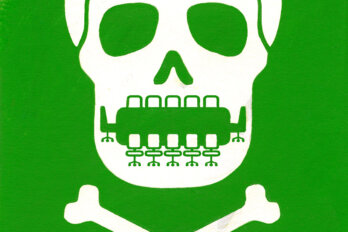November 2, 2032
Good morning, distinguished guests.
My name is Ms. Anh Dri, and I’m honoured to be speaking here at Great Ideas: A Conference about Solutions, Not Problems. I’m here on behalf of the Legitimate Rape Reduction League in Toronto, Canada. This is a very special day for the LRRL, marking both the twentieth anniversary of our organization and the fifth consecutive year that Toronto has had fewer than ten reported sexual assaults.
It’s an unbelievably low figure, I know, and one that all of you have been trying to emulate, with little to middling success, for two decades now. I’m here to remind you that Toronto’s model of Legitimate Rape Reduction requires a certain moxie that none of your governments have yet summoned. It requires vision. It requires courage. It requires severely limiting the rights and freedoms of half of your population.
To recap: in 2012, the issue of Legitimate Stranger Rape came to a head in Toronto after a series of high-profile sexual assaults. At least one rapist was breaking into the homes of sleeping women, while a downtown park became a site of fear and dread, and a woman was brutally murdered while walking home from work one night. Standard responses—such as increased police presence, and terrified women restricting their activities—had little effect. And so, a group of female lawyers, anti-violence activists, politicians, policy makers, and rabid, feminazi man-haters joined together to form the LRRL.
In early 2013, the LRRL proposed a simple solution: a curfew for men. Every male person over the age of thirteen would be legally required to be accompanied by at least one female person over the age of eighteen when leaving his home between the hours of 9 p.m. and 6 a.m.
The LRRL argued that any respectable male would be able to find a female friend or family member to accompany him on any reasonable outing after dark. A man who couldn’t find a female chaperone was either embarking on an unnecessary journey, or, very likely, planning an errand of ill intent. In our view, a curfew would allow police to find and track these obvious suspects.
Unsurprisingly, the Legitimate Rape Prevention Curfew for Men Act-Bill 227 caused a stir when it was introduced. It was fought over bitterly, and repeatedly sent back to various committees for adjustments and amendments. Then, in fall 2013, Krista Ford, niece of the city’s then-mayor and daughter of Canada’s current Minister of Foreign Affairs, was catcalled by a group of men early one morning as she walked the family’s bichon frieze. It was 5:45 a.m., and Ms. Ford was wearing a baggy, egg-stained tracksuit. Her hair was unbrushed, as were her teeth. In her rush to calm her yelping puppy, she had left her mace at home. Ms. Ford was so shaken by the obviously unprovoked incident of almost-LSR that her father and uncle made passing LRPCMA-B227 a priority of their time in office. By January 2014, it was a city-wide reality. That fall, both Fords won over 80 per cent of the female vote.
Let me confirm what you already know: the curfew has been a phenomenal success. It has reduced its intended target—LSR—by over 95 per cent. Limiting men’s movement after dark has also resulted in a significant decrease in just about every other type of violent crime. Encouraged by this new zero-tolerance approach to sexual assault (and, by 2020, a majority female police force), the city’s women also reported thousands of cases of Legitimate Family/Friend Rape. Initially, this deluge created a substantial law-and-order backlog, but as of the 2026 Canada Census, Toronto has reduced LFFR by 38 per cent.
Punishments for violating the LRPCMA-B227 curfew include driver’s license demerit points, community service, and fines. Repeat offenders may face jail time and permanent travel restrictions. Severity depends on the offender’s criminal record and the discretion of the prevailing judge. Liberal judges often issue mere $15 tickets to men caught travelling to and from nighttime shift jobs alone.
Of course, some sentences have been controversial. In February 2015, soon after the law was enacted, a twenty-three-year-old first-time offender was arrested while walking alone at 11 p.m. His eventual sentence was a full week in jail. This kicked off city-wide protests by the young man’s advocates, who argued that his backpack containing a laptop and numerous heavy textbooks proved his defense of a study session at his university library, located three blocks from his apartment. We at the LRRL sided with the judge, who opined that his clothing incriminated him. Freezing rain and below-zero temperatures notwithstanding, his navy blue jacket, black gloves, and large, face-obscuring wool toque suggested a desire to disguise his identity and travel unnoticed.
Human rights are important to the LRRL, and we have compromised on certain compassionate amendments to the original LRPCMA-B227. As of 2023, gay men (either cis- or transgendered) age twenty-five and over can apply to use a smartphone-based GPS system that feeds their location to a police database, allowing them to travel without a chaperone. An extended curfew time is available to male parents with children enrolled in government-approved nighttime activities who are willing to affix a rapidly blinking blue light to both the front and back of their person. Many fathers have expressed enthusiasm for the curfew, and I’d like to applaud them as loving, self-sacrificial parents for whom the safety of their daughters is paramount to their own freedom.
Thank you for giving me the time to outline Toronto’s two decades of Legitimate Rape Reduction success. I urge you to enact similar laws. Yes, some people will always argue that LRPCMA-B227 is an unjust form of gender profiling that punishes innocent non-offenders. My refutation is anecdotal: when I travel outside of Toronto, I revert to my pre-2014 psyche with frightening speed. As night descends, I become distrustful of cab drivers, strangers in elevators, and, really, the majority of men. Certainly history—and the rape statistics in your own barbaric cities—has shown us that an unfortunate percentage of the male population is unable to exert self-control.
This conference is about solutions, not problems, and a curfew is the best solution we have at this time. If restricting the movements of half its population is humanity’s only good tactic for reducing sexual assault, we at the LRRL are proud to advocate limiting the half most likely to do harm.





